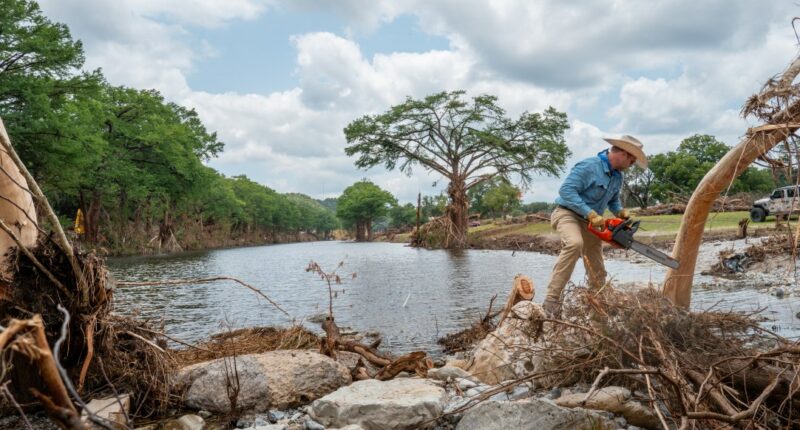Share this @internewscast.com
AUSTIN (Nexstar) Texas’ first special session of 2025 starts Monday, during which state lawmakers will consider new congressional maps approve the proposal.
Michael Li, senior counsel at the Brennan Center for Justice, specializes in voter participation among minority communities in Texas. He said that the only possible way he sees Republicans being able to maximize gains in Texas is by breaking up majority-Black or Latino districts in cities, like Houston and Dallas.
“In Texas, there really isn’t a way to maximize Republican seats anymore without really targeting the political power of communities of color,” Li said. “It’s for districts that are majority non-white and that are all represented by Black or Latino members that have been floated around as districts that might be redrawn or tweaked in some way.”
A statement from the Texas Democratic Party released July 10 identified the Houston-area 9th, 18th and 29th congressional districts, as well as the Dallas-Fort Worth 33rd congressional district as the seats most vulnerable to redistricting. All are currently represented by Black or Latino members.
The Voting Rights Act of 1965 requires certain states to have majority-Black or Latino districts, and courts have recently struck down maps for violating that provision. Alabama and Louisiana were forced to draw new maps ahead of the 2024 election that created an additional Black-majority district, and Texas is already facing litigation over its current maps.
The non-white population of Texas is also quickly growing. Texas earned two additional seats in Congress after the 2020 Census, and is currently projected to gain even more if population trends hold.
“This special session and the redrawing of Texas’s congressional map … is coming just as we have census data showing that people of color provided all of Texas’s population growth between 2023 and 2024,” Li said. “The white population of Texas actually fell a little bit for the first time.”
That leaves congressional candidates with little time ahead of the December filing deadline, especially if the new maps become tied up in court.
“It’s almost certain that Black and Latino voters, and perhaps other voters, will be in court trying to block these maps, and there will be a fight about whether the maps will be in place for 2026 or not,” Li said. “There isn’t a lot of time to get new maps in place.”
There are also other risks besides legal challenges: Current districts are drawn in a way that minimizes competition and packs cities into just a handful of districts, giving Republicans an edge. Any new map the GOP draws would make current Republican seats more vulnerable in order to create gains. That comes with risks, Li said, because population and demographic changes could upend the map in unpredictable ways.
Li said that Republicans are facing pressure from President Trump to get it done, but will have to weigh whether or not they want to take a gamble.
“The question really is, are they willing to give that up, particularly the younger and the members who have less time in Congress, are they really willing to have a much more competitive map for the rest of the decade,” Li said.
THC regulation up for consideration
Gov. Greg Abbott identified six bills he vetoed that are up for further consideration during the special session.
Chief among the list is the highly scrutinized Senate Bill 3, which would have outlawed all consumable hemp products containing THC, the intoxicating chemical found in cannabis. In his veto proclamation, the governor made it clear he wants the legislature to look at regulating the hemp industry over a complete ban.
He argues the way SB 3 is currently written would be legally fought for years to come.
“If I were to allow Senate Bill 3 to become law, its enforcement would be enjoined for years, leaving existing abuses unaddressed. Texas cannot afford to wait,” Abbott wrote.
At one point in its legislative lifespan, SB 3 was not structured as a complete ban on THC products.
State Rep. Ken King, R-Canadian, substantially changed the bill in the House Committee on State Affairs. It allowed the hemp industry to continue manufacturing hemp drinks and tinctures, and “other consumable forms as long as they do not resemble a common snack marketed to children,” according to a summary of the bill changes.
The King version of the bill also created a regulatory framework for those products that would have been carried about by the Texas Alcoholic Beverage Commission and the Department of State Health Services.
“It allows for some hemp sales to be continued. It bans vapes. It bans vape shops. It bans all synthetics. Delta-9, the natural flower that’s grown and sold in Texas, would remain,” King said.
The bill was ultimately changed back to its original state after an amendment by State Rep. Tom Oliverson, R-Cypress, on the House floor.
Lt. Gov. Dan Patrick championed SB 3 the entire session and made it one of his top priorities before the session started. He called the products “poison” to the community and would not settle for anything less than an outright ban.
First flood-related bill filed ahead of special session

Sen. Sarah Eckhardt, D-Austin, filed the first flood-related bill of the special session. It proposed changes to emergency warning systems operated by municipalities and counties.
Senate Bill 25 would allow municipalities to collect residents’ contact information to enroll them in emergency alerts, sent via text message, with their consent and the ability to opt-out at any time. Texans would also be able to choose to enroll in emergency alerts when they apply for or renew their driver license.
The bill represents the first of expected flood-related measures as lawmakers prepare to address the July 4 Central Texas disaster that exposed gaps in warning systems across the region.
Shortly after SB 25 was filed, Sen. Carol Alvarado, D-Houston, filed SB 26, a flood relief program that provides loans to small businesses. SB 26 would provide interest-free loans to small and micro-businesses to be used for any expenses, so long as they are Texas-based, impacted by the Central Texas floods and be in good standing with the state.
Abbott placed flood warning systems at the top of his 18-item special session agenda following the July 4 floods that killed dozens of people across Central Texas. Kerr County, which suffered the heaviest losses, lacked a flood warning system despite being located in an area known as “flash flood alley.”
The disaster raised questions about whether residents received adequate warnings before the Guadalupe River rose 26 feet in 45 minutes, devastating communities along its banks.
During the session, joint House and Senate committees will examine disaster preparedness and flooding issues. The committees will hold their first hearing July 23 at the Capitol, followed by a second hearing in Kerrville to gather resident input.
The committees will examine four areas outlined in Abbott’s agenda: flood warning systems, flood emergency communications, relief funding for Hill Country floods, and natural disaster preparation and recovery.
Eckhardt’s bill adds to growing legislative momentum to address flood preparedness issues that became apparent during the Central Texas disaster, which marked one of the deadliest flood events in state history.
Odessa lawmaker files bill to scrap STAAR
After multiple failed attempts in recent years, State Representative Brooks Landgraf, R-Odessa, is once again trying to eliminate the STAAR test from Texas public schools.
Landgraf’s House Bill 92 aims to eliminate the STAAR exam and reduce the scope of standardized testing in Texas classrooms. The bill targets all state-mandated assessments that exceed federal requirements and is intended to take effect in the 2025–2026 school year, if passed.
“Texans have made it clear: They want to scrap the STAAR test,” said Landgraf in a statement. “Students, parents, teachers, and taxpayers are tired of an unnecessarily expensive system that prioritizes high-stakes test scores over actual learning.”
HB 92 proposes a shift away from a test-driven education system and instead seeks to restore classroom instruction time and encourage a more well-rounded learning experience. The bill would retain only those standardized tests that are required under federal law, aiming to alleviate pressure on both educators and students.
Landgraf pushed similar legislation during the regular session, but fell short of final approval. He says the special session presents another opportunity to “get this right.”
“We were so close to scrapping STAAR earlier this year,” he said. “This bill gives Texas another chance to get this right and put the focus of our school system where it belongs, on preparing students for life, not just filling in bubbles on an exam.”












